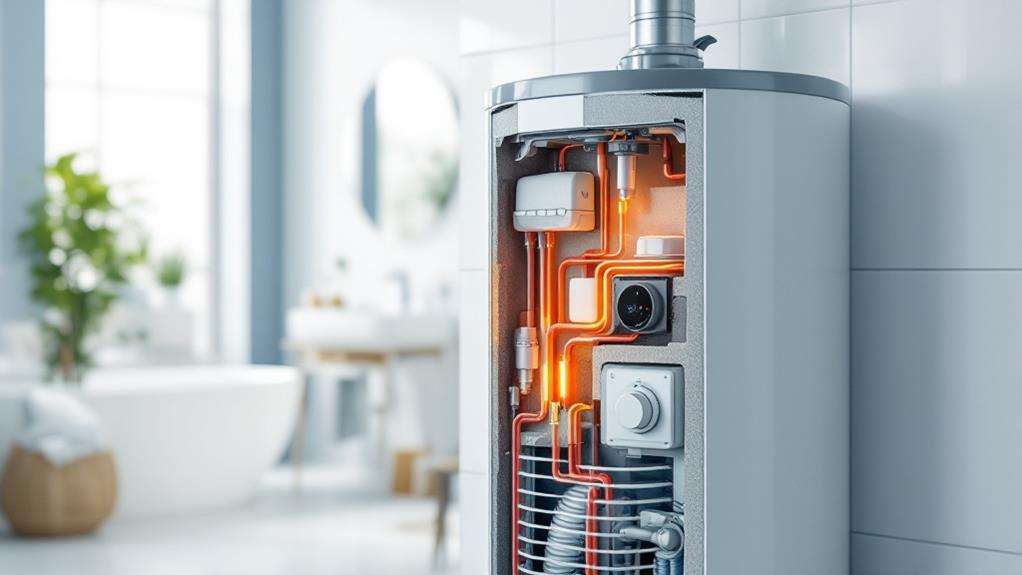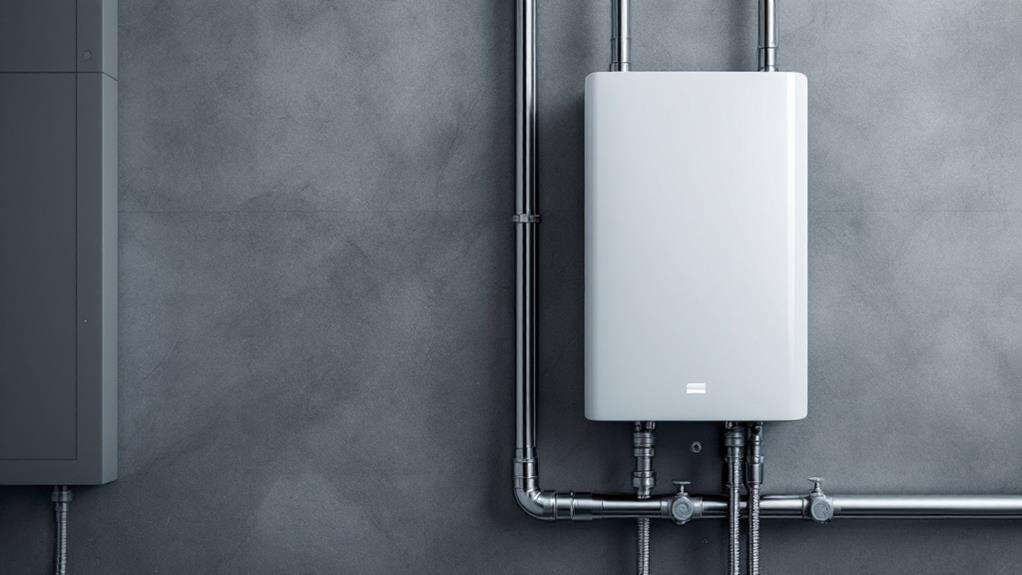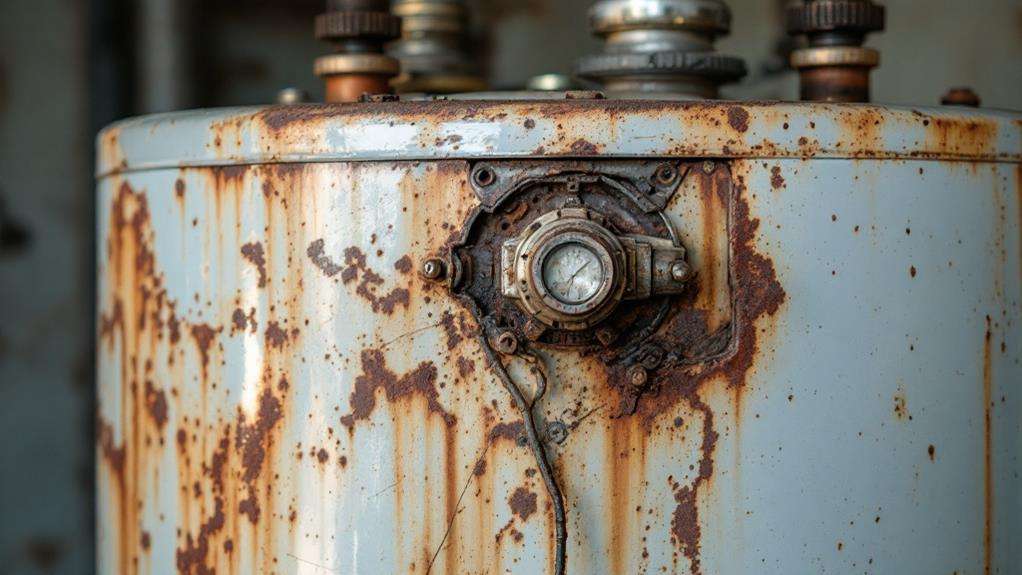How Often Should You Service Your Water Heater?
The frequency you should service your water heater depends on the type and your home's water conditions. Tank water heaters generally need an annual flush and inspection, while tankless models require professional maintenance every 12-18 months. Hard water accelerates sediment buildup, so softer water regions need less frequent service. Staying on top of maintenance ensures your water heater operates safely and efficiently. If you want to learn more about properly caring for your water heater, there's plenty of helpful information to explore.
Key Takeaways
- Tank water heaters generally need servicing every 1 to 2 years to flush out sediment buildup.
- Tankless water heaters require professional servicing every 12 to 18 months to maintain optimal efficiency.
- Regular inspections and maintenance can extend the lifespan of both tank and tankless water heaters.
- Signs that your water heater needs service include insufficient hot water, leaks, or unusual noises.
- The frequency of servicing depends on factors like water usage patterns and local water quality.
Types of Water Heaters
What are the different types of water heaters? You'll typically find two main categories: tank and tankless. Tank water heaters store a set amount of hot water, usually ranging from 30 to 80 gallons, and use either gas or electricity to keep it heated. Tankless water heaters, on the other hand, don't store water but instead heat it on-demand as you need it. They're usually powered by gas and can provide a continuous supply of hot water. When it comes to tank capacity and heating method, the type you choose will depend on your household's hot water needs and energy preferences. Larger tank sizes work great for families, while tankless heaters are ideal if you want to save space and energy. Regardless of the style, regular maintenance is crucial to ensure your water heater runs efficiently for years to come.
Factors Affecting Maintenance Needs
Several factors can impact how often you'll need to service your water heater. Your water usage patterns play a significant role. If you have a large household or use a lot of hot water, your heater will work harder and accumulate sediment faster, requiring more frequent maintenance.
Additionally, the local weather conditions can affect your heater's performance. In areas with hard water, mineral buildup can accelerate, necessitating more regular flushing and inspections. Conversely, in regions with softer water, your heater may require less attention.
The type of water heater you have can also influence maintenance needs. Tankless models, for instance, generally require service less often than traditional tank heaters. Understanding these factors can help you develop a proactive maintenance schedule, ensuring your water heater operates efficiently and has a long, productive lifespan.
Electric Water Heater Servicing

Servicing an electric water heater requires a different approach compared to its gas-powered counterpart. You'll need to focus on the electrical element and the condition of the water heater tank.
Replacing the electrical element is a crucial part of maintaining an electric water heater. Over time, the element can become corroded or fail, leading to decreased efficiency and potential leaks. Be sure to turn off the power to the unit before attempting any repairs, and follow the manufacturer's instructions carefully when replacing the element.
In addition to the element, you'll also want to inspect the water heater tank itself. Look for signs of rust, scale buildup, or other damage that could compromise the tank's integrity. If you notice any issues, it's best to have a professional take a closer look and determine if the tank needs to be repaired or replaced.
Gas Water Heater Servicing
Maintaining a gas water heater requires a slightly different approach compared to an electric model. You'll need to pay extra attention to the proper fuel line inspection, as any leaks or issues could pose a serious safety hazard. Regularly checking the connections and ensuring the gas flow is unobstructed is crucial. Additionally, you should schedule thermostat adjustments to keep your water at the optimal temperature, typically between 120-140°F, to prevent scalding while also maximizing efficiency.
Beyond these essential tasks, you'll want to flush the tank periodically to remove any sediment buildup, which can reduce the heater's lifespan. Depending on your usage and water quality, this may need to be done annually or every few years. Remember to also inspect the anode rod and replace it if necessary to prevent corrosion. By staying on top of these maintenance steps, you can extend the life of your gas water heater and ensure it operates safely and efficiently.
Tankless Water Heater Servicing

Proper maintenance of your tankless water heater involves a bit more attention than its tank-based counterpart. Unlike traditional tank heaters, tankless units don't require annual flushing, but they do need periodic servicing to keep them running efficiently. Ideally, you should have your tankless heater professionally serviced every 12 to 18 months.
During a tankless service, the technician will inspect the unit, clean any mineral buildup, and ensure the proper tankless installation is maintained. They'll also check the heat exchanger, burners, and other components to identify any potential issues before they become problems. Maintaining a tankless maintenance schedule is crucial, as neglecting service can lead to decreased efficiency, premature wear, and even complete breakdowns. Remember, investing a bit of time and money in regular tankless maintenance can extend the life of your unit and keep your hot water flowing consistently. Don't wait until you have a problem – stay on top of your tankless water heater's service needs.
Preventive Maintenance Tips
While tankless water heaters require periodic professional servicing, there are also some preventive maintenance steps you can take to keep your unit running smoothly between visits. Performing regular inspections can help you identify and address any potential issues early on. Check the unit's venting system for any obstructions or debris, and ensure the air intake is clear. Additionally, it's important to keep the unit's exterior clean by wiping down the surfaces with a damp cloth. Over time, mineral buildup can accumulate within the unit, so it's a good idea to have the unit professionally cleaned on a regular basis. This will help maintain the unit's efficiency and extend its lifespan. By taking these simple preventive measures, you can help ensure your tankless water heater continues to provide reliable, energy-efficient hot water for your home.
Signs Your Water Heater Needs Service

Your water heater's performance can provide valuable clues about when it may need professional servicing. One of the most obvious signs is if your water isn't getting hot enough, even after adjusting the thermostat. This could indicate a problem with the thermostat's calibration, which a technician can address.
Another sign is if you notice leaks around the tank or connections. Leaks can happen due to sediment buildup, which a regular flushing schedule can help prevent. Rusty water or unusual noises, like rumbling or popping, are also red flags that something's amiss and your heater needs attention.
If you're not getting the expected lifespan from your water heater, that's a clear indication it may require servicing. Proper maintenance, including regular flushing and inspections, can extend its lifespan and ensure it continues delivering the hot water your household depends on.
